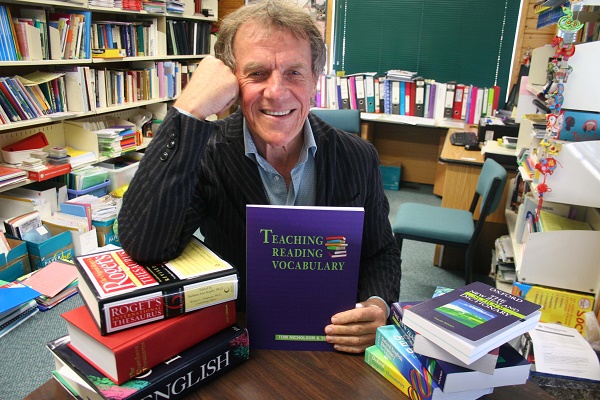
Many parents I spoke to were worried about their children and when I asked what they meant they were quick to show me examples of their children’s writing. With their smartphones, they had taken photos of their children’s writing and brought them along to the workshop to show me.
When I looked at some of the handwriting I could see immediately that while children’s spelling was definitely logical and sounded quite similar to the real word, there were many errors, even on what were quite simple words to spell, that would be easy to correct if they knew more about phonics. For example, one 10-year-old wrote: “We went to Echuca with my famly. We mist a week of school, yay! We do my favret sport warter sking. It is nice to be with famly. It is fun!” Another wrote: “I was warking prst a groop of boys and gerls and they war plauing football. I sood trigh football.”
These examples are familiar to researchers in this area, showing that many students struggle. More than a third of our children are below national standards in writing and some of this will be because of spelling.
Why is this happening? One complication is that spelling is low status as a subject to teach. It is called a “surface” feature which suggests it is mechanical, a skill, not important compared with “deep” features such as content and ideas. Of course you will never be a good writer if you do not have good ideas but if you can’t spell it is awfully hard to express those ideas in print.
Spelling – a modern Cinderella, a neglected child at school
A second complication is that many teachers are concerned about spelling but are not sure how best to teach it – phonics was not part of their training and they desperately would like to teach spelling better.
A third complication is the digital age, our students are growing up in a world of instant messaging using different platforms in which invented spelling hz bcum gr8 and valid. Students are receiving contradictory messages: at school, correct spelling is normal and outside of school, texting, snapchat, tweets are in abbreviated textspeak and as long as it sounds right then this is also normal. The irony is that good spellers are also good at textspeak – they can move between these two worlds.
Research shows that, even with only a few spelling errors in an essay a teacher’s rating of the work will drop substantially. A single spelling mistake can ruin the chance of a job when you send in an application. In the workplace, a text message or email sent with a spelling mistake puts the sender and the company in a bad light.
Poor spelling undermines quality of work
At the other end of the spectrum, some students are amazing spellers, as anyone who has watched the movie Spellbound about the national American spelling bee can tell you. Really good spellers in junior high school can spell words like mnemonic, bildungsroman, notochord, and conquistador.
In contrast, difficulty with spelling makes even the spelling of simple words an arduous task and uses up precious mental energy that could be used for thinking up ideas. Overall, the research tells us that being poor at spelling results in a lower quality of work than you are capable of.
Spelling is more important than ever in this digital age. Yes, there are predictive spell checkers and this technology helps but a lot of spelling mistakes slip through. Students who struggle with spelling are particularly on the back foot because the spell-check software is often not sure what they have written and gives a word they did not mean to say.
Phonics teaching does help tremendously with spelling because it teaches students rules. Phonics may not give complete accuracy but it usually puts you 90 percent there in terms of accuracy; the last 10 percent will come with lots of reading and writing practice. And yet we do not capitalise on phonics as a teaching strategy. In most classrooms, students are given a list of words to learn on Monday and tested on Friday. Yes, many students will learn how to spell by this rote method but many will not and need phonics strategies to make them great spellers.
Phonics produces incredible results. I’ve never seen a student learn phonics and not improve. I’m not saying that phonics is the whole answer but it is a fantastic foundation that children can build on to become great readers and spellers. A study in Scotland found that children taught intensive phonics in their first year of school who were tested for reading and spelling in Year 7 were years ahead of a control group who had not received such intensive instruction.
These results convinced the English government to change their teaching to intensive phonics. Each year, schools in England now children sit a compulsory national phonics check and results are showing that children’s skills are rapidly improving. Australia is also looking at introducing a phonics check. Do we really want Australia to beat us at spelling? This is not a pleasant prospect.
Phonics is a pathway to better spelling and writing and we are letting many of our little heroes become zeros by not teaching them this crucial skill.
The much-delayed English draft curriculum is now out for consultation, generating discussion from teachers.
Research from AUT demonstrates arts, culture and recreation have positive impacts on all aspects of…
How effective has the school phone ban been in achieving its aims? Researchers from the…
School camps and excursions deliver hands on learning experiences, helping to consolidate classroom learning.
Innovations in AV technologies present new opportunities to engage with students. We look at how…
A new report from the University of Auckland’s Our Voices Project asks young people what…
This website uses cookies.